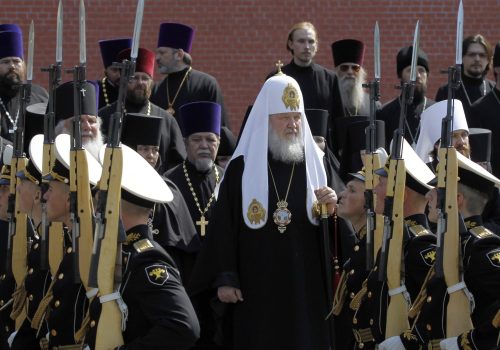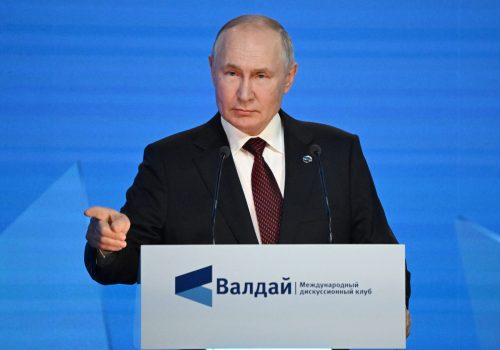The unprecedented removal of Kevin McCarthy as House speaker has thrust US politics into uncharted territory, while also sparking alarm across the Atlantic in Ukraine. The October 3 vote was preceded by heated debate over the latest proposed aid package for Ukraine, with opponents of continued US support for the Ukrainian war effort playing a key role in McCarthy’s downfall. Many in Kyiv are now fearful over the future of US aid, which has so far been crucial in allowing the country to resist Russia’s ongoing invasion.
Ukraine continues to enjoy the support of the Biden administration as well as strong bipartisan backing in Congress. However, with American politics in paralysis and a vocal minority apparently intent on opposing further US funding for Ukraine’s defense, there are concerns that vital deliveries of military aid could be delayed or derailed entirely. As House Republicans prepare to select a new speaker with an internal vote scheduled for Wednesday, the Atlantic Council invited a number of Ukrainians to share their perspectives on what the congressional leadership drama could mean for Ukraine’s fight against Russian aggression.
Oleksiy Goncharenko, Ukrainian member of Parliament, European Solidarity Party: This is a sensitive matter as it concerns domestic US politics. Obviously, the decision to oust the House of Representatives’ speaker rests solely with elected US representatives. Nevertheless, it is also crucial for all of us to bear in mind that the United States and Ukraine are key allies in the current war. To a significant degree, Ukraine’s survival hinges on the support it receives from the United States and its NATO allies. At the same time, Ukraine is resisting one of the United States’ biggest rivals.
Recent developments in the US Congress have sparked something akin to panic in Ukraine, especially among the country’s political elites. Many have begun to fear that Ukraine may lose American support. Personally, I don’t think US support will end. There is simply too much at stake for both countries. But even delays in military aid or a decrease in current levels of support could have disastrous effects. With this in mind, it is now vital to recapture the spirit of spring 2022 and demonstrate that democracies are stronger than tyrannies. I encourage our American colleagues to remind the world that political debates are part of the democratic process and ultimately make us all stronger.
Stay updated
As the world watches the Russian invasion of Ukraine unfold, UkraineAlert delivers the best Atlantic Council expert insight and analysis on Ukraine twice a week directly to your inbox.
Solomiia Bobrovska, Ukrainian member of Parliament, Holos Party: It is worrying that according to one July survey, 59 percent of Republicans say the United States has done enough to assist Ukraine. It is also worrying that part of the US political establishment does not appear to recognize the global significance of Ukraine’s fight against Russian aggression, which is a war to save the international security system as we know it.
The coming appointment of a new House of Representatives speaker is a decisive moment for Ukraine. This choice will determine the future course of US support for Ukraine. We now need to engage with the more radical elements within the Republican Party and also with the American public. This is a task for Ukrainian public diplomacy, for our politicians, and for Ukrainian public figures. There is no question that we will continue our fight no matter what, but we must seek to maintain and consolidate bipartisan support for Ukraine in the United States, as this underlines the importance of the cause we are all fighting for.
Volodymyr Dubovyk, associate professor, Odesa Mechnikov National University: The US budgetary turmoil came at the most inconvenient time possible for Ukraine. No time would be good, of course, but delaying provision of aid in the middle of Ukraine’s current counteroffensive when it needs uninterrupted supply of weapons and funds is particularly painful.
Much will now depend on how soon a new speaker is chosen, as well as the identity of McCarthy’s successor. At present, opponents of continued US support for Ukraine do not have enough votes to achieve their objectives, but they can certainly delay the process. If the new speaker represents the America First faction of the Republican Party, this would not be good news for Ukraine and would be a harbinger of harder times ahead. Members of Congress who favor continued US support for Ukraine should waste no time and should continue drafting bills and packages even as the search for a new speaker continues. Meanwhile, the Biden administration should focus on reminding the American public why support for Ukraine is in US interests.
Eurasia Center events

Maksym Skrypchenko, president, Transatlantic Dialogue Center: When analyzing McCarthy’s removal, some believe he had long been walking a tightrope concerning the US position on Ukraine. This was largely a result of intense pressure from the Freedom Caucus, a relatively small force that was nevertheless potent enough to vote him out. Such pressure likely influenced his somewhat skeptical public statements on Ukraine.
While there is speculation that McCarthy genuinely wanted to maintain or even boost US support for Ukraine, good intentions don’t always lead to decisive actions. Throughout McCarthy’s leadership of the House of Representatives, it was apparent that both the Freedom Caucus and other vocal MAGA-aligned Congress members had a strong influence on his decisions. Looking ahead, I hope the next House speaker will be less influenced by these internal challenges and will pave the way for greater stability in US-Ukrainian relations.
Oleksii Antoniuk, global affairs and economics student, Yale University: With attention currently focused on the removal of the House speaker, it is easy to overlook the bigger picture. Military supplies to Ukraine might decrease in the short term, but they will continue. Even though the emboldened radical elements within the Republican Party have gained more leverage in Congress, US aid to Ukraine still enjoys broad bipartisan support.
Anti-Ukraine voices currently dominate the media news cycle, but this is in part because they are deemed newsworthy and outrageous. Meanwhile, a recent Chicago Council poll found that 63 percent of Americans favor continuing military and economic aid to Ukraine, including 50 percent of Republican voters. The majority of Americans say aid should continue until Ukraine has reclaimed all of its territory.
Support for Ukraine remains just as strong within US political circles. Pro-Ukraine voices comprise the majority of both parties in Congress, and any new House speaker must respond to their demands. Leaders of the relevant congressional committees in both chambers are resolute about continuing aid. Likewise, the Biden administration remains steadfast in its support for Ukraine. When one looks beyond the recent headlines, there are good reasons to be optimistic about the future of US-Ukrainian ties.
Peter Dickinson is editor of the Atlantic Council’s UkraineAlert service.
Further reading
The views expressed in UkraineAlert are solely those of the authors and do not necessarily reflect the views of the Atlantic Council, its staff, or its supporters.

The Eurasia Center’s mission is to enhance transatlantic cooperation in promoting stability, democratic values and prosperity in Eurasia, from Eastern Europe and Turkey in the West to the Caucasus, Russia and Central Asia in the East.
Follow us on social media
and support our work
Image: Olga Conover of Palm Bay, Fla., walks down the bridge at sunset carrying her merged American-Ukraine flag near the end of a march marking the one-year anniversary of Russia invading Ukraine, late Thursday afternoon, Feb. 23, 2022, in Melbourne, Fla. February 24 marks the first anniversary of Russia's invasion of Ukraine, as Ukrainians braced for possible new Russian strikes. (USA TODAY NETWORK via Reuters Connect)




